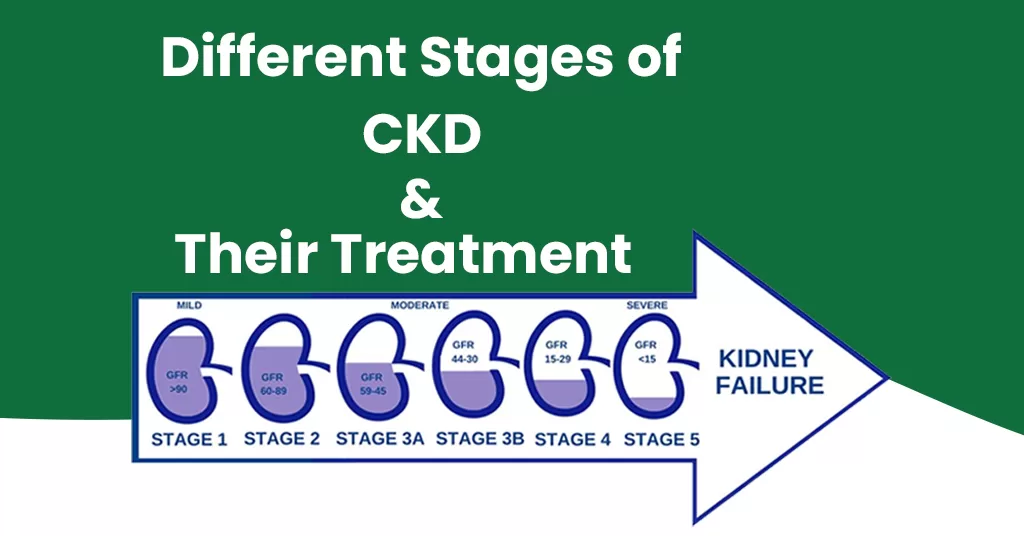Chronic kidney disease (CKD) and its Prevalence
Chronic kidney disease (CKD) is an illness that impairs your kidneys’ functioning ability.
The CKD disease is among the main causes of mortality around the world, affecting approximately 13.4% of the population.
Chronic kidney disease (CKD) associated complications, including uremia, anaemia, and electrolyte imbalances, arise as renal function deteriorates. As a result, the quality of life of the patients is adversely affected. Due to persistent impairment, chronic kidney disease can progress to various stages.
Both young and old can be affected by chronic renal disease. Early detection of CKD, medications, and lifestyle modifications may assist in reducing or halting the further development of the disease.
How is the CKD stage calculated?
The CKD stages can be ascertained from the patient’s test results. One of the main indicators of the kidney’s functioning is creatinine, a waste product produced during muscular activity. Creatinine levels in the blood are lower when the functioning is optimal, but the levels rise when the functioning of the renals declines.
Glomerular filtration rate, also known as GFR, is used to assess renal functioning. The estimated GFR (eGFR) is a mathematical formula based on an individual’s age, gender, and serum creatinine level (found by a blood test). This value indicates how effectively waste and extra fluids are filtered by the glomeruli. Therefore, eGFR levels will decrease if the renals are damaged.
The kidney doctor can use this information to determine the best course of action for the patient and how frequently one should get tested to keep an eye on their condition.
Understanding about CKD Stages
The state of renal functioning determines the chronic kidney disease stages. With each stage progression, the renals function less effectively. Based on the test results and how well the kidneys work to filter waste out of your blood, Chronic kidney disease (CKD) is divided into five stages:
Stage 1
Stage 1 kidney disease indicates that the individual has minor renal damage and a normal eGFR of 90 or above. Since the kidneys are still functioning properly, one might not be experiencing any major problems, but one might be exhibiting mild symptoms of the disease, such as protein in urine.
Stage 2
It indicates that there are slight problems with the renals and that the eGFR has dropped to between 60 and 89. However, the kidneys continue to function properly for the most part. Additional indicators of stage 2 kidney disease might include blood or protein in the urine or higher-than-normal creatinine levels.
Stage 3
When the filtration rate falls between 30 and 59 and mild to severe renal impairment is observed in the patient, he is considered to have CKD stage 3. The ability of kidneys to filter waste and excess fluid from the blood is compromised. Waste can build up in the body, which might lead to other health issues, including high blood pressure and bone damage. Depending on the eGFR, stage 3 CKD is divided into two substages:
Stage 3a When the value of eGFR is between 45 and 59.
Stage 3b When the value of eGFR is between 30 and 44.
Stage 4
It indicates that the patient has moderate to severe renal problems with an eGFR ranging from 15 to 29. The kidneys’ ability to sustain overall well-being is hampered. Waste accumulation in the body may result in various health issues, including heart disease. The hands and feet may swell, and one may experience lower back aches as symptoms.
CKD stage 4 is the final stage prior to renal failure.
Stage 5
It indicates significant renal impairment and an eGFR of less than 15. The kidneys have failed (ceased to function) or are very near to failing. Extremely low renal functionality is observed. This is sometimes referred to as end-stage renal failure. CKD stage 5 symptoms include low or no urine formation, skin colour changes, and a loss of ability to regulate blood pressure. Significant declines in renal function put more stress on the heart, thereby raising the risk of heart attacks and strokes.
Tips & Lifestyle Changes for Kidney Disease (CKD)
Whether one has the disease in its early or late stages, there are certain lifestyle changes for kidney disease (CKD) that can help in dealing with the problem. The tips include:
- Staying hydrated
- Maintaining a healthy BMI
- Staying away from smoking
- Engaging in regular physical activity
- Consuming a nutrient-rich balanced diet
- Cutting down on processed foods, high-sugar beverages, and salt
Chronic Kidney Disease Treatment
CKD treatment is crucial for maintaining kidney function. Treatment can reduce disease symptoms and prevent the progression of the illness. Chronic kidney disease treatment often includes medications to prevent renal damage and remedies for any underlying problems.
Owing to medical advancements and the introduction of new treatments in recent decades, an optimal range of treatment choices for the symptoms resulting from complications associated with CKD disease is available nowadays. An increasing proportion of individuals with chronic renal disease are considering alternative medical systems (AMS), such as homeopathy, for treatment.
It originated in Germany in the late 1700s and has been widely used around the globe since then. Being side-effect-free and individually customizable makes homeopathy kidney treatment an excellent option for dealing with chronic kidney disease. In order to design the best medication, homeopathic treatment for kidney takes into account general symptoms and constitutional indications while also attempting to address the underlying causes of kidney disease.
A sizable portion of the Indian population, particularly those living in rural and semi-urban areas, rely on homeopathy for medical treatment. Therefore, several homeopathic clinics and kidney specialist doctors are available in India due to the specific need for kidney treatment by homeopathy in the country. Even a few athletes and celebrities utilise homeopathy as an alternative medicine.
Why is Bharat Homeopathy Best for CKD?
Bharat Homeopathy helps to stimulate the body’s natural defence mechanisms with its tailored medications. At Bharat Homeopathy, medicine is prescribed after thoroughly analysing the patient’s case history and all the conditions of an illness—mental, emotional, and physical. Proper planning and extensive research are done by our team of kidney specialists led by Dr. Mahima and Dr. Kanchan while creating a course of treatment for each patient. We have demonstrated our credibility by maintaining the highest standards for protecting the confidentiality of patient data and are another name for reliability in the realm of healthcare.


